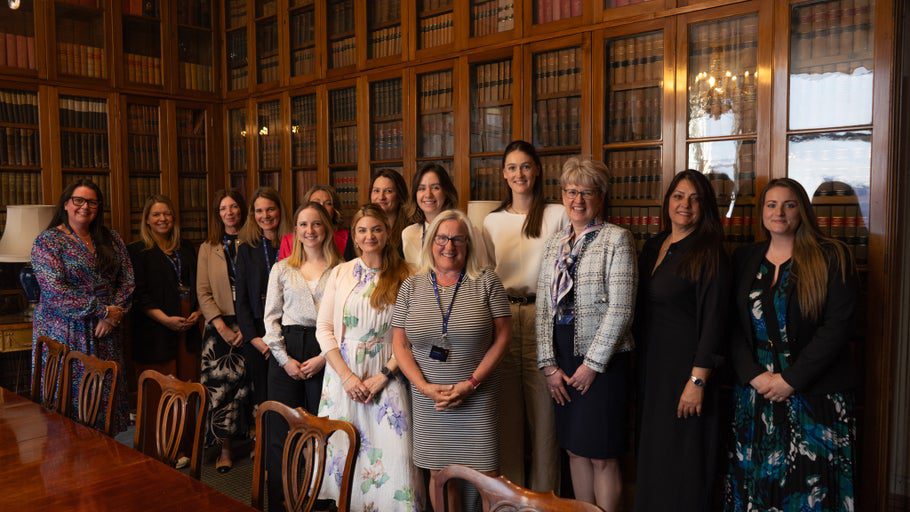In April 2025, Christie & Co, Compass Carter Osborne, and GK Strategy hosted a female-led roundtable discussion on the challenges in the children’s social care sector across England and Wales. Here are the key takeaways.

For a roundtable event held in April 2025, hosts Hannah Haines (Head of Healthcare Consultancy, Christie & Co), Michâela Deasy (Head of External Communications, Compass Carter Osborne) and Lizzie Wills (Senior Partner & Head of Private Equity, GK Strategy) were joined by some of the biggest female names in the UK children’s social care sector.
The roundtable brought together operators, lawyers, investors, and sector experts, all of whom share a passion for quality healthcare and for driving an increased awareness of the challenges faced by operators across the country.
Below are some of the key highlights from the discussion.
THE INTRODUCTION OF PROFIT-CAPPING IN CHILDREN’S SOCIAL CARE AND WHAT THIS MEANS FOR THE SECTOR

Overview
Ahead of last year’s election, Labour pledged to reform the children’s social care system to improve the outcomes of looked-after children and those in care, and to address the funding crisis in the system following years of local authority funding pressures.
As part of the King’s Speech in July 2024, the government announced its plans to introduce the Children’s Wellbeing and Schools Bill, which formed part of its legislative programme of over 40 new bills. One of the most controversial elements of the Children’s Wellbeing and Schools Bill was announced the following November; the ability of the government to intervene directly in the market to introduce a profit cap on providers.
Concerns about excess profit-making in the children’s social care sector are not new, and the sector has historically done a good job at engaging with the government about why the fees charged by the independent and private sectors are typically higher than those provided by local authorities. This includes the complexity of the placements provided, with the private and independent sector providing a higher proportion of placements for children with highly complex needs, often where they need additional therapeutic support, or one-to-one care. The private sector also takes a higher number of children who have already experienced several placement breakdowns in local authority provision. The ability of the sector to be able to make a level of profit allows it to reinvest in meeting quality standards, hiring and training staff, and delivering new settings, often at the request of local authorities who are struggling with high levels of demand.
The Government has been clear that it does not intend to introduce a profit cap immediately and will only do so if its broader package of measures is unsuccessful in tackling what it sees as ‘unacceptable profiteering’ and rebalancing the market. There will also be a detailed public consultation before anything is implemented, including discussions specifically with local authorities and providers.
If the profit cap is implemented in the future, providers will be required to submit an annual financial return to the government to enable their profit levels to be assessed. Again, details are limited in terms of what information will be included in these returns. Details will also be subject to consultation with final plans set out at a later date. Should enforcement action need to be taken against a provider, this will be in the form of fines, the maximum amounts of which are expected to be set out in the subsequent secondary legislation.
Views from around the room: What will profit capping mean for the sector?
The Government might say it’s not against profit making, just against ‘profiteering,’ and that the steps it is taking are necessary to address the latter. The consensus is that the government’s approach to having a profit cap as a backstop in the new legislation will be a useful tactic to encourage providers to reinvest their profits into delivering better outcomes for children and young people, despite the potential for causing short term uncertainty.
It might be comforting for providers to know that, if the Government does implement a profit cap, it is expected to take several years to go from ambition to delivery, given the complexities involved. Significant parts of the mechanism will need to be set out in secondary legislation, and many of the details that are yet to be ironed out will be controversial, including how profit will be determined for the cap, and if it will be per placement, per business or per setting (or indeed based on some other metric).
Banks are watching the sector closely, but invested funds (especially impact funds) have a continued interest. Investors that are likely to do well are those that are reinvesting profits back into the UK healthcare infrastructure. However, smaller organisations may struggle to scale due to dampened investor interest, raising questions about how they can demonstrate ROI to investors and build an investment case.
In its 2022 report on children’s social care in the UK, the CMA acknowledged that comparing costs in the sector was complicated by differences in the needs of children placed in different settings and variations in how costs are calculated and reported. Rather than focusing on profit, which loses sight of the child, participants at the roundtable agreed it should be based on the outcomes and progression of the child. It should be a partnership, with everyone working together.
This was echoed around the room, alongside the challenges in measuring outcomes using such methods as the BERRY approach which matches needs against costs. Every looked-after child undergoes reviews to ensure outcomes are measured. A universal framework for evaluating providers based on outcomes rather than profit was seen as a potential solution that government should consider. The sector is well placed to advise the government on how approaches to date have worked, and how they could be refined in future.
We have already seen changes in Wales through its Eliminate Agenda, whereby it became the first nation in the UK to legislate to prevent profit-making by private companies in relation to children’s residential and foster care services by 2030. The Health and Social Care (Wales) Act 2025 received Royal Assent in March 2025 and mandates that children’s residential and foster care services be provided exclusively by local authorities, charities, or not-for-profit organisations.
Wales can serve as a case study for England. The sector in Wales is very prescriptive about what can and can’t be done by providers. The Welsh Government is now considering the role cooperatives could play in the delivery of services and they’ve pushed back the final stage in the roll-out of the plan by three years (to 2030) A lot of what is happening is political and their agenda is quite clear, so England would be wise to keep a watchful eye on what is happening over the border.
What action should be taken?
- The consensus around the table was that we need to evidence the positive outcomes the private and independent sector is delivering for children and young people, to counter negative perceptions around profit-making. There was agreement that the sector has historically not been sufficiently vocal in making this case, and demonstrating the excellent outcomes it supports across a group of vulnerable individuals and their families.
- The focus should be on positive outcomes for children, not profits – so providers, parents, the government, and the media all need to work together to lift up the sector and highlight the amazing work that it does for each child, keeping in mind that the outcomes for each will be different.
- There is a continuing lack of constructive dialogue between some Local Authorities and operators throughout the health and social care space. The sector must focus on demonstrating positive outcomes and maintaining strong relationships with local authorities to navigate the ongoing political changes.
- Any new policy must be outcomes-focused, fit for purpose, workable in practice and designed and implemented after full consultation with the sector.
INVESTMENT IN THE SECTOR AND ONGOING COMMUNICATION ISSUES IMPACTING PROGRESSION

Views from around the room: What could the children’s services sector be doing to improve communications between the Government and operators?
The landscape of children’s services is marked by a myriad of challenges and opportunities, particularly in the context of collaboration, funding, and policy implementation. Despite numerous operators striving to collaborate and communicate effectively, the sector is often met with negativity, largely due to underfunded government spending across all areas.
A significant issue is the lack of focus on the child. There is insufficient engagement from government with the private sector, and the narrative needs to shift to place the child at the centre of all decisions. When the child’s needs are prioritised, quality naturally follows. However, there is an imbalance as each child and business is different, and policies are often rushed through without adequate consultation with operators.
An immediate concern is the sustainability of providers amidst declining fostering rates and increasing care needs. Many smaller businesses are at risk of not surviving due to these pressures. Perceptions that mainstream education settings continue to struggle to support those with lower-end spectrum needs is driving an increasing number of parents who feel they are left with no other option but to seek Education, Health and Care Plans (EHCPs) and external support, resulting in an increasing demand for specialist support on the lower end of the scale. The government’s current policy agenda around mainstreaming and inclusivity for children with less complex SEND is an attempt to address the ‘drift’ towards specialist schools.
It was also highlighted that, amidst funding challenges, local authorities are focusing on immediate budgets rather than long-term savings and the positive impact on the child that could be achieved through early intervention. The debate around profiteering stresses that higher margins do not necessarily equate to higher quality, nor do lower margins imply lower quality. The goal should be to support the child’s needs, improve outcomes, and subsequently lower the costs of provision. However, the primary challenge remains budgetary and funding constraints faced by local authorities.
Bespoke solutions, such as tuition hubs for children close to re-entering mainstream education are essential. These hubs can provide tailored support to ensure a smooth transition back into the school environment.
What action should be taken?
- The sector must focus on child-centric approaches, effective collaboration, and innovative solutions to navigate the current challenges. By prioritising the child’s needs and demonstrating positive outcomes, the sector can build a stronger case for adequate funding and support. As a provider, if you can demonstrate where money is being reinvested to drive up quality and outcomes, that’s a useful and constructive addition.
LEADERSHIP AND AN EFFECTIVE MANAGEMENT STRUCTURE IN HEALTHCARE BUSINESSES

As demand for high-quality, specialist care continues to grow, how can management navigate the complex environment, mitigate risk, secure investment, and ensure sustainability and innovation within the sector?
Investors in this space are showing a notable shift in appetite. While continuing to focus on identifying future leaders from within the sector – whether for CEO, CFO, or CPO roles – they are increasingly looking beyond traditional industry boundaries to source talent. This reflects a growing recognition of the need for financial and operational strategies to evolve with rising demands, including revenue diversification.
Take the Chief People Officer (CPO) role, for example. The CPO’s mandate is to foster a culture that attracts and retains a diverse team – one that is calm, focused, driven, and open to embracing technology, with a strong understanding of risk and quality outcomes.
Similarly, today’s CEO must be multifaceted, a strategic leader with deep experience in execution, a keen understanding of risk, and a strong focus on quality. They must leverage technology that delivers real value, foster a purpose-driven culture, understand competitors and market dynamics, and prioritise meaningful metrics and KPIs. Above all, they must lead with empathy and drive a people-first agenda.
Views from around the room: What does strong leadership look like to you?
- Not losing sight of why you’re there creates a robust culture
- Trust. Being able to challenge one another at every level is healthy and creates a stronger business
- Need a passion for the sector itself and an understanding of what internal and external drivers
- Someone who has risen through the ranks, who is an inspiration to others and brings about a strong, positive culture
- While knowledge of the sector is beneficial, it’s not necessarily the case that the best talent is a sector specialist. Sometimes it’s about looking more broadly at the talent out there that could be great at driving leadership
- Someone with an inherent entrepreneurial quality who can find a solution to a challenging landscape without diluting what the business is set to achieve
- A leader who takes real-life stories back to the boardroom, reminding the corporate team that it’s not just about the numbers, it’s about bringing the personal element back
To find out more about the changing landscape of the children’s social care sector, or to join the team’s next roundtable event, contact:
Lizzie Wills: lizzie.wills@gkstrategy.com
Hannah Haines: hannah.haines@christie.com
Michâela Deasy: michaela@compasscarterosborne.com










